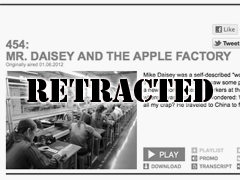Last week NPR's This American life retracted one of its most popular episodes ever after it was revealed that the story contained significant fabrications based on "reporting" by Mike Daisey. The retraction episode is remarkable and should be heard and read in full (transcript here in PDF) to be appreciated.
The Daisey case raises all sorts of interesting questions about journalism, but also more generally about the nature of argument, facts, data, persuasion and politics. For his part, Daisey sees little wrong in his fabrications, justifying them based on their political effect:
I am proud that my work seems to have sparked a growing storm of attention and concern over the often appalling conditions under which many of the high-tech products we love so much are assembled in China.Part of the strength of Daisey's reporting was the simple narrative that he presented, with good guys and bad guys, leaving little room for complexity or nuance. Writing at Reuters, Felix Salmon says that this itself should have been a tip off:
Real life is messy. And as a general rule, the more theatrical the story you hear, and the more it divides the world into goodies vs baddies, the less reliable that story is going to be.Recall that in the aftermath of initial revelations about Peter Gleick's phishing of the Heartland Institute, we heard defenses of his action that included claims that he was only doing the same thing that journalists do to the importance of looking beyond Gleick's misdeeds at the "larger truth." Consider also what was described in the UEA emails as "pressure to present a nice tidy story" related to climate science as well as the IPCC's outright falsification related to disasters and climate change. Such shenanigans are so endemic in the climate change debate that when a journalist openly asks whether the media should tell the whole truth about climate change, no one even bats an eye.
But some people do feel that certain issues are so important that there should be cause in political debates to overlook lies or misrepresentations in service of a "larger truth" (Yellow cake, anyone?). I have seen this attitude for years in the climate change debate (hey look, just today), and often condoned by scientists and journalists alike.
I even wrote about this problem back in 2001 when I was invited by the National Academy of Sciences to be among a small group of experts to brief several Senators and the new Secretary of Treasury:
As I prepared for the Senate Forum a number of colleagues expressed concern that my work might be used (or misused) in the political process to support particular positions. In a nutshell, my position, shared with a number of colleagues, is that the "global warming: yes or no?" debate has become an obstacle to effective policy action related to climate.The Mike Daisey case ought to prompt some soul-searching among scientists (who seek to communicate to the public and policy makers) and journalists more generally, as the issues implicated by his fabrications are far more common than many would like to admit.
Several of these colleagues suggested that I should downplay the policy implications of my work showing that for a range of phenomena and places, future climate impacts depend much more on growing human vulnerability to climate than on projected changes in climate itself (under the assumptions of the Intergovernmental Panel on Climate Change).
One colleague wrote, "I think we have a professional (or moral?) obligation to be very careful what we say and how we say it when the stakes are so high." In effect, some of these colleagues were intimating that ends justify means or, in other words, doing the "right thing" for the wrong reasons is OK.
. . . I likened this situation to the following hypothetical. Imagine that as policy makers are debating intervening militarily in a foreign country, the media report that 1,000 women and children were brutally murdered in that country. This report inflames passions and provides a very compelling justification for the military intervention. A journalist discovers that, contrary to the earlier reports, only 10 soldiers died. What is the journalist's obligation to report the "truth" knowing full well that it might affect political sentiments that were shaped by the earlier erroneous report? When science is used (and misused) in political advocacy, there are frequent opportunities for such situations to arise.

